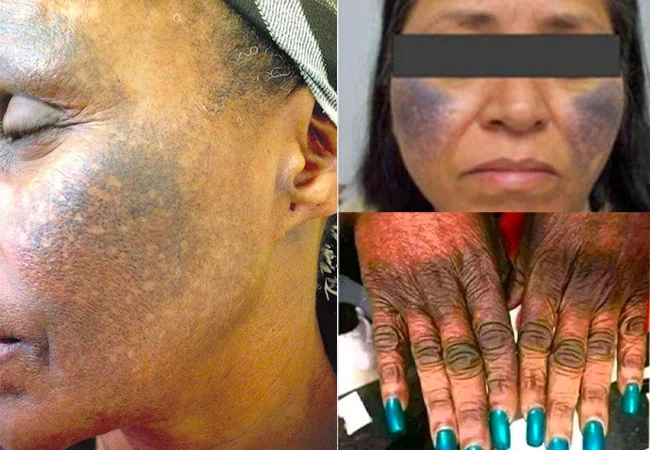 Medical experts who carried out research on the effects of skin lightening cream to the health of those who engage in it have linked skin lightening cream to multiple organ failure.
Medical experts who carried out research on the effects of skin lightening cream to the health of those who engage in it have linked skin lightening cream to multiple organ failure.
Researchers, J E Rudge and M Raithatha, in their work, Critical Illness and Multiporgan Failure Following Topical Application of Skin-lightening Preparation, posited that the application of salicylate-containing cream could lead to body poisoning and damage of the organs. Salicylate is a major ingredient in most of the skin lightening products. The scholars asserted that plasma salicylate concentrations greater than a given quantity “often cause severe symptoms and are potentially fatal.”
They buttressed their findings with this report, “A previously well 44‐year‐old Afro‐Caribbean woman presented to the emergency department with a one day history of worsening respiratory distress associated with lethargy, pyrexia and confusion. Before admission, she had applied a salicylate‐containing topical skin‐lightening preparation to her body, sparing the hands, feet and face. Treated areas were wrapped in transparent plastic film for approximately 24 h before being removed due to development of widespread superficial burns and worsening symptoms.”
After examination this was what they found, “Initial assessment identified respiratory distress and tachypnoea, bilateral basal crepitations and type I respiratory failure. Cardiovascular assessment demonstrated sinus tachycardia and hypotension. Neurologically, the patient was confused with a Glasgow coma scale score of 14/15. Skin assessment revealed superficial burns affecting 90% of the body surface area (BSA), with small, intact blistering to 4% BSA but no mucosal involvement. There was a persistent pyrexia above 38 °C.”

Initial investigation also revealed raised inflammatory markers, acute kidney injury and arterial blood gas analysis confirmed type I respiratory failure, the researchers advanced.
It has been brought to the fore many times that skin lightening cream damages the kidneys but those who engage in it would be arguing against it. There was one major case where a young woman, the daughter of a politician wanted kidney transplant. Obviously if you trace the older pictures of their parents you will find that they were dark skinned before the wealth from politics began to come and her mother transformed to light skin and her daughter followed suit. But hers became a medical issue when her kidney became damaged that she needed replacement.
US Department of Health has warned that skin lightening product can cause health problems.
“Tests of skin lightening products in Minnesota showed that some products have dangerous levels of mercury. Being exposed to the mercury in these products could potentially cause serious health problems,” the US Department of Health warned.

In another publication, the UK authorities have warned against the danger of skin lightening cream and identified the major ingredients in such creams and their harmfulness to the body.
The following ingredients found in some skin lightening products have been proven to be harmful to health and cause permanent skin damage:
Hydroquinone
Hydroquinone inhibits production of the pigment melanin which gives skin its colour. However, melanin is vital to protect the skin against UV radiation so your body will over compensate by producing more melanin. This results in a darker patchier appearance developing; it damages the elastin strands in skin causing premature aging and weakening of the skin; it can cause neuropathy (a disease of the nervous system) and it can damage your liver. It also increases the risk of skin cancer from UV radiation. It has been illegal across the EU since 2001 to sell products with hydroquinone.
Hydroquinone is a deritivative of Benzene and has been found listed by alternative names in some ingredients lists (for example 1,4-Dihydroxybenzene).
Mercury
Mercury is toxic and accumulates in the body, damaging the kidneys, liver and brain, causing a host of serious and potentially fatal health problems. It can also cause foetal abnormalities if used in pregnancy. Mercury has been banned from consumer cosmetic products since 1996.

Steroids
Steroids (topical corticosteroids) such as clobetasol propionate and betamethasone dipropionate should only be used under medical supervision. They are prohibited in cosmetic products. Misuse can cause skin thinning, stretch marks, bruising and broken veins. Eczema, psoriasis and acne can all flare up and there is an increased risk of skin infection, sores and boils. Prolonged use can affect the release of hormones that control and stabilise vital functions with very serious or life threatening consequences. Steroid-based creams have legitimate medicinal uses but can only be supplied on prescription in the UK. Such products must also be licensed under medicines legislation and they should not be available from cosmetic retailers.
“There are hundreds of different brands sold around the world, many of which are packaged differently and contain different ingredients depending on which countries they are intended to be sold. Often what look like identical products may actually have different formulations and labelling to meet strict EU safety rules. It is important to read the labelling and ingredients list and check with your local Trading Standards if you are uncertain as to whether a product is legal or not,” UK health authorities said.
 Quelins – Relationship, Sex, Marriage and Health News around the world Quelins Blog is an online magazine about relationships, love, information about marriage, partnerships and issues patterning to all that.
Quelins – Relationship, Sex, Marriage and Health News around the world Quelins Blog is an online magazine about relationships, love, information about marriage, partnerships and issues patterning to all that.



